#believable and compelling flaws.
Explore tagged Tumblr posts
Text
Here is a direct translation of an FFXVI scene at Origin I have no small number of grievances with in its English localization, as it sends a very...cruel...message about whether a person's suffering is valid. The localization and the direct translation are both shown. (Credit is in the screenshot.)

The result is radically different on a philosophical level. The original JP intent was clearly to send a message about overcoming dire human weakness through unity, whereas the EN localization goes completely off the rails with what feels like nothing but chest-pounding toxic positivity. It also contradicts several elements of what the story has clearly shown to the contrary--Ultima did suffer, horribly and for ages, but handled it poorly when unexpected complications arose in his designs for survival.
In a way, I'm relieved. I don't have to be particularly angry with Clive as a character anymore, because the English version fails to preserve authorial intent for this part. Maehiro did nothing wrong. Some dumbfucks at SE NA need to pry their heads out of their asses, though. Strength through unity is not an inaccessible message to a western audience, and we sure as hell don't need absolutist chest-pounding brutality in our good guys.
#ffxvi#ff16#Clive Rosfield#ffxvi ultima#Most--although not all--criticisms I have for Clive become moot once localization BS is accounted for.#And those criticisms that remain are things I wouldn't bother voicing because they're actually evidence of a well-written character with#believable and compelling flaws.
16 notes
·
View notes
Text
Sometimes I want to shake people by the shoulders and scream, you need conflict to make a story interesting!
If every character got along perfectly and acted in everyone’s best interest, that would be unrealistic to the human condition but more importantly—so fucking boring
#give me deeply flawed and complex characters#I want them messy and lashing out blindly#I want them selfish and protecting only themselves#I want them praying on other people’s goodness to further their own agenda#and I want to be able to see their fragments of goodness#their guilt and love and pain#their core values that they believe justify their actions#boiling characters down to ‘good’ and ‘bad’ does such a disservice to what makes them compelling#I am so tired of the morality discourse
102 notes
·
View notes
Note
I prepared this ask in the Notes app only for Tumblr to not let me copy and paste the text so here’s a screenshot bc I’m not typing all that again lol
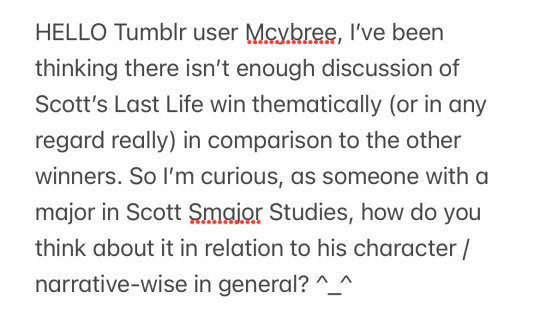
there’s this funny trend i see in trafficblr art, in that, when there’s a lineup of every past winner, most players will be surrounded by symbols that were relevant to their POV, and perhaps drawn with the last emotion they’d felt just before death (or maybe just whatever emotion the artist most associates with the character). The winners might be doing something, or in a pose that reflects how they won—there are a million ways to make a life series winners’ piece. What’s funny about it is that no one ever seems to know what to do with Scott. He’s most often just standing there looking mildly disgruntled. And for the symbols he’s most depicted with, it’s typically poppies, which are only relevant to the first season; last life scott does not place any importance on poppies, poppies dont ever come up beyond a brief interaction in episode 1, and jimmy as a whole is less relevant to scott’s pov in last life than he is in every other season.
not that this is an issue with the art; the pieces are beautifully done, it’s just representative of how little fandom discussion there is about scott’s win thematically. Most discussion I see are about the watchers and how they hate scott for defying him or whatever, but watcher lore is not discussion of the series itself as much as it is a fan creation that is retroactively applied to create meaning.
Scott’s Last Life win, to me, was achieved through accomplishing what Third Life Scott could not.
Scott spent 3L waiting for his day one ally to die. He kept Jimmy at a distance, often fully gearing himself up first before backtracking to help Jimmy along. There’s a funny disparity in episode 5, where Jimmy spends the entire episode trying to get good enchants on his iron armor, while Scott sets up a villager and gets good enchants for the full diamond set that he’d already had in storage, in about half the time Jimmy took trying to accomplish his own goal, iirc. This disparity is also something scott acknowledges with the “I’ll always be more powerful than you” line, but it’s been a while since ive written a post like this so i unfortunately do not have the episode number memorized on that one anymore. But Scott goes on to explain that he’ll always have better armor and weapons, which is why Jimmy could never kill him. This is all to say that Jimmy and Scott do not stand on equal grounds in their alliance, and, more importantly, Scott does not depend on Jimmy. The progress Scott makes in Third Life is entirely his own, with Jimmy as more of an afterthought than a teammate.
This is what landed Scott his all time lowest placement. After Jimmy dies first, Scott loses sight of his priorities and dedicates his remaining time alive to avenging Jimmy, rather than focusing on his own longevity (like he’d go on to do in future seasons). And, in that way, Scott’s attitude towards Jimmy (disposable, going to die, unreliable) was an indirect contributor to Scott’s low placement.
In contrast: Scott could not have won Last Life without Pearl. Scott has to rely on Pearl from day 1, having only two lives to start with himself. Pearl gives Scott two lives total. Pearl and Scott are almost always together. They made it to the final four by each other’s side. And that forced day 1 reliance on pearl breaks down the role scott typically assumes (*he’s* supposed to be the person people rely on, he’s supposed to be the one bringing everything to the table) which curbs his tendency to see himself as above others, which then allows for the most genuine happiness i have ever seen him have in an alliance.
The comparison between the way Scott talks to Pearl and the way Scott talks to Jimmy is like night and day. Scott doesn’t compliment or otherwise say anything supportive towards Jimmy (save for the “I believe in you! MCC has trained you for this moment!” during Jimmy’s dare to flare attempt) until after Jimmy has already died. With Pearl, however, Scott is much more open about his care towards her, saying that she’s his best friend and that he loves her as early as episode 2. There’s more examples but between last life and third life, Scott’s attitude towards his primary ally is completely different, and i think it’s symptomatic of Scott allowing himself to love and be vulnerable rather than keeping himself at a distance. And i think that it’s so special that scott won the season where he was so close with his day one alliance, directly because of his day one alliance.
because, to me, one of scott’s defining characteristics is his self reliance. He will have allies, yes, but he often assumes a supportive role and acts as a supplier. He doesnt like taking things from other people. Last Life is different because Scott relies on Pearl, too. It’s also not a coincidence that last life is the only season where scott is normal about jimmy but that’s a different post
tldr yes scott won last life with the power of love but not in the way people say he did (ignoring the boogeyman curse was strategy ☝️)
I SHOULD NOTE, though, that the boogeyman curse was still a fail. Although purposeful, Scott receives the penalty and apologizes to his team. He says he just couldn’t bring himself to do it. I do think that his words here aren’t fully honest— he’d admitted earlier that this choice was fully for strategy. But I also think his apologetic attitude here is genuine. Scott is a perfectionist, he needs to succeed; failing, though purposeful, still hurts. He feels the need to apologize. It means so much to me that his win in last life directly follows the choice to fail on purpose. I’m insane though idk
third life scott embodies scotts flaws while last life scott is him overcoming them 👍 is what im trying to say 👍 last life scott is everything that third life scott could not bring himself to be, in allowing himself to love and depend on other people and overall just be a person.
#I couldve explained this way better but i came up with the thesis in the very last paragraph#And went ohhh. Well. The post is already written#So yes i could reformat this all and make it much more compelling by breaking down exactly what i think scotts flaws are through—#Series by series analysis#and then go on and use examples from ll to paint it as the antithesis of all that#all to put in a provable factual way just HOW different scott is in last life compared to other series#And how this aided him and eventually got him the win#But i think thats like. A whole essay?#im imagining an essay format. and i do not. want to write a whole essay right now#so im hoping this kind of shitty condensed version gets my point across#there is an annoying lack of citations but as stated i have not done a scott post in a while and dont have this shit as memorized#also its my birthday in 6 minutes can you believe it#asks#that.blue.mf
102 notes
·
View notes
Text
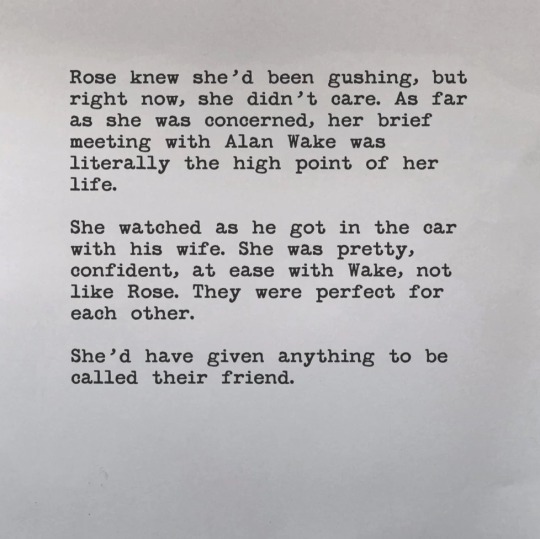
i like that rose specifically wants to be friends with both alan and alice in the first game. like yay! parasocial relationship also extends to the wife!
#it could’ve gone the Cynthia route where rose kinda resented alice#but yay! big win for parasocial relationships! she also fantasizes about alice to some degree!#I have some Issues with the writing in Alan Wake 1 including the women (namely alice and partially rose)#but this is a detail I really enjoy and I do honestly want her and alice to meet#a while back I saw a theory. idk if it was on here or Reddit. about alice being potentially being the person sending messages to rose#i don’t exactly believe that since it could just be a future Alan loop. but the concept compels me.#alan wake 2#rose marigold#alice wake#I love her she’s so weird and insensitive (saying this positively). her biggest flaw is writing self insert rpf of stephen king#and honestly that’s funny as hell so can that really be called a flaw ☝️#also does anyone remember rusty and roses relationship#I remember HATING rusty lmaooo ahfjdjajfjdkajd#it was the comments about rose barely being out of her teens and being sad over his old marriage 🤨 like ok rusty idc#sorry to any rusty fans
64 notes
·
View notes
Text
i could talk for hours abt the differences between itafushikugi and sashisu but ultimately it comes down to the former being the cutest little bunnies and the latter being dirty raccoons you find in a trash can outside of your apartment complex
#if you get it you get it 🫡🫡#sashisu are ALL soggy little losers#emotionally constipated meowmeows#they’re sooo similar and i truly believe they’re the only ones who can fully stand each other#(said w immense affection)#but itafushikugi are just . soooo . precious. they have flaws and their own emotional constipation but it’s not NEARLY as bad#itafushikugi are your beloved childhood friends who you cry with and laugh with no matter how much time passes#sashisu are . different variations of the homoerotic codependent situationship you form in high school and never move on from#like . sashisu are all extremely kind people. they just happen to also be fucked in the head#one day i’ll make a more serious post abt this bc i think it’s so interesting and compelling and heartwarming#to see the gap between gojo’s generation and the next when it comes to emotional vulnerability and destigmatization#but for now i’ll just leave it at this 😭#my beloved little dumpster babies <333#ari noises ✩
39 notes
·
View notes
Text
i have the same feelings about sasuke’s politics as i have about padme’s
#fandom has put them in a pedestal which is annoying because it strips their flaws that makes them sooo compelling to me#i get it w sasuke because he is indeed one of the characters that goes against the fucked up system but i still believe when ppl ignore that#his politics also suck a bit it gets zzzz#he’s a mess let him be a mess#mine
7 notes
·
View notes
Text
Genuinely, why did so many people stop watching BNHA when it started getting good.
It's as if when BNHA finally started digging into their core themes of caring for the oppressed and "broken" did people start to not like it anymore. Its as if when diving into the serious flaws and tears in their society and ideals did people start to think it "fell off" for the mainstream audience.
When the story became more than kids wanting to be heroes, wanting to be stronger- but about something much greater, bigger, and scarier, did people think it got "worse"- or no longer a story they want to engage with.
What does this say about the anime/manga community? You tell me.
I leave more thoughts in the tags, in case you're interested
#I legitimately believe that ppl started to stop watching bnha#when it started putting in the center#just how much they fucked over these ppl. the heroes and villains.#and why they became that way#and how Deku gets all “emo” and shit#its not being emo its being self-sacrificial and suicidal#and also how nearly EVERYONE misunderstood Ochako.#how ppl think its Ridiculous that Shoto wants to save his family#and even heals with his FATHER. his ABUSER.#when the “oh so evil villains” are given so much HUMANITY#when HEROES arent perfect shining idols#people were just not comfortable with that#so they stopped watching#bcus hey it was just supposed to be abt teenagers getting stronger and saving people#i swear to the heavens above#i genuinely dont trust ppl who think bnha “fell off” anymore#you just...really dont understand the text thats Right There#sigh.#and again this series is FAR from perfect. it has FLAWS#but it is also compelling and unconventional okay.#evelynprtext#bnha#mha#boku no hero academia#my hero academia#deku#izuku midoriya#ochako uraraka#uravity
4 notes
·
View notes
Text
It’s a watchable piece of faux history, but the movie does not know what to do with its own heroine, content to leave her to the clutches of its villain: Henry.
yeah, i don’t think i’m going to be a fan of this one.
#i mean i know it's just one review; but...#that is literally everything i hate#a push to dissociate every wife of henry from...henry#which. you can't really credibly do? they were married to him#it's my possible entirely most unpopular opinion ever but i do believe all of them did WANT to marry him#they weren't the one in pursuit; that wasn't how the 'game' went#but i believe each was a decision made by them#which does not = 'they were all uninhibitedly in love with him' which is how that is always taken for some reason#i mean without reservation? i don't think any of them were. but he wasn't either .#certainly not without limits#it's also just boring. it's fucking boringggg. there is simply no flavor#as horrible as the kh depiction was in like the tudors it was so much more compelling to watch her with agency#than like idk. whatever mid shit worsley's docuseries put it#bcus it made it feel all the more gut-wrenching when she lost it#same with the depiction of AB's for all its flaws even#and why the kparr and js arcs were the most fucking boring .#firebrand 2023
15 notes
·
View notes
Text
god i know that complaining abt fic which most of you haven't read, and which i won't, for politeness' sake, identify in this post, is a great way to come across as both dickish and boring—
but i've been rereading a very long, very satisfyingly plotty series that's a fandom darling and the thing is, when you read like 400k of an author's work at once it really starts to become painfully apparent what their priorities are, by which i mean two things:
holy shit they're obsessed with 'what if strong powerful men who could hurt you didn't (but did hurt Bad Guys) (and it was sexy of them),' which leads into
holy shit they do not appear to have thought through the implications of saying 'i will have my heroes take over the same power structures that have enabled abuse, make no real changes to those structures other than swapping out the leadership, and then claim that everything is wonderful now bc Good Men Are In Charge'??
like. i don't necessarily need every passing fantasy to present me with a coherent, revolutionary system of politics and ethics—sometimes things are just fun and sexy and not especially Examined and that's fine!—but by the time someone's written literally almost half a million words, and done a lot of worldbuilding while they were at it, i am going to start squinting if they seem to think a Good Man can e.g. become an emperor by killing off the leadership of multiple countries and installing puppet kings loyal to him and still remain a Good Man, even if the justification was that the original leadership was maltreating its citizens and deserved to be extrajudicially executed. like. this shit was a bad, autocratic move when the US did it in real life and it's still bad now that you're having our mutual blorbo do it in fiction! and that's not even getting into the whole thing where like. they've got servants who the Good Man and his friends ""treat well"" but who very much remain second-class citizens in terms of how the story actually frames them and their concerns. [this was also a huge issue i had with foz m*adows' most recent book—everyone wants to write about fantasy nobles but they also want to make them good people and it's like. honestly i think it might be better to get comfortable writing about flawed people, but also—if your aristos aren't treating their servants like equals and your text isn't either, you haven't actually cracked the Moral Aristo paradox, sorry!] like, there's nothing that says your story has to depict a fully Healed World, nor should there be! but it's troubling if you seem to be convinced you've written one (and have your wide-eyed love interests constantly marveling at it!) when you very patently haven't.
#in all honesty—i've framed a lot of this as political/ethical critique‚ and like‚ it IS‚ but also—#i'm just really frustrated because like. the whole 'what if people were shockingly nice to you' thing feels like it SHOULD be better for me#but in actual fact i find myself totally turning up my nose at it and i can't totally work out why#i mean i guess part of it is that this author's Traumatized Love Interests are always really innocent victims#which i can't identify with emotionally because i feel like a piece of shit#so i need a story that's more like 'person who's been told they were a monster for so long they believe it gets convinced they aren't'#'(lovingly and sexily)'#but also i think a lot of it just. isn't subtle enough. like i need to have to put pieces together so i'm implicated in my own catharsis#being constantly told 'wow it's so amazing i'm not being abused by this person who COULD abuse me!! that's so sexy of them!'#is just. not doing it for me. like. 'not abusive' is not actually sexy to me‚ unfortunately. i need some character traits.#and unfortunately the ones this author tosses in for flavor ALSO don't convince me#because they never actually manifest in the story. it's like 'oh this character is so prickly—but never actually offends the LI.'#'oh this other character is so gruff—but the LI understands that about them from day one and doesn't take it personally.'#like. if the hero's 'flaws' don't actually cause any problems—they aren't flaws#anyway. i've definitely complained about this exact series multiple times on here at this point#but that's the thing—it's compelling enough i keep going back to it‚ so i get extra-frustrated by its flaws#whereas like. there's a lot of stuff that's much worse that i've been much less frustrated by#because i never had any particular hopes for it#anyway. thx for yr patience in this fully self-inflicted Trying Time‚ lmao#i guess this can get filed under#bookblogging
12 notes
·
View notes
Text
Okay… I am going to begin this by saying I love Vil. I agree that he gets a lot of hate he does not deserve.
But I actually do think I will challenge the idea that he doesn’t force his standards upon others.
Specifically, Epel.
And no, I am not talking about his accent. I understand Vil’s point in that and accept it.
But the fact of the matter is, even though Epel eventually came to see the power that being cute could lead him to have, Epel did not want that. I am specifically remembering Epel’s ceremonial robe vignette and the groovy image for it and…

Does that look like the face of someone who is happy with what he is being taught or being forced to learn? He looks m i s e r a b l e. And this is before Vil even enters the room and immediately targets him to begin his “training” to become a proper Pomefiore student. And that instant training is HARSH and PHYSICAL.
I understand that Vil is the Housewarden, but he does not do this with anyone else in the dorm, and forcing Epel to take etiquette lessons and the like? That’s not what the dorm is SUPPOSED to be about.
The Pomefiore dorm is supposed to be founded on the ideal of the Fairest Queen’s tenacity, not the Fairest Queen herself. So, with that in mind, Epel’s drive and determination to be more manly and tough no matter how hard it would be for him to achieve his goal would have fit the ideals the dorm is supposed to promote.
But everything I see suggests the entirety of the dorm (NOT just Vil) focuses on idealizing the Fairest Queen herself, not her tenacity, so they focus on beauty and royalty. To the point that Vil feels the need to harshly correct Epel, so that he is a “proper” Pomefiore student. Because Vil beat him in a fight at the welcoming ceremony and so Epel is under his thumb.
I honestly, truly adore Vil. I wish he had more love. Because he deserves it. But I also don’t think that just because I love his character I should ignore his flaws. It’s not an all or nothing thing. I don’t have to hate him and think he is everything wrong with Twisted Wonderland or love him and think he is flawless.
Vil is not terrible. He deserves to be a hero in many movies. He deserves his time to shine. He is not a villain. He is beautiful and talented and has worked hard to get to the top and stay there.
He also DOES force his standards on others at times and Epel can attest to that.
smth that like. i end up thinking abt a lot is the way vil is a character whose in-game experiences are really mirrored by a big chunk of the way fandom treats him.
vils beauty is smth that he’s been villainized for his entire life. he’s too beautiful, too gorgeous, and in the minds of many, that automatically equates to things like “mean/evil/cruel.” as if his beauty = villain
and that perception is one he struggles with. no one lets him play the role of hero bc a lot of the time, a hero is someone the audience roots for and relates to. but no one can “relate” to vil bc his beauty others him. neige has a beauty that is innocent but also attainable. that’s what makes him the perfect hero. for some reason, it’s almost unfathomable to most that someone beautiful who also cares about being beautiful could be smth other than a “mean girl” or a villain.
and the thing is, vil does care abt beauty! and that’s okay! valuing beauty is not inherently evil, and the way fanon (and when I say fanon, i obviously don’t mean everyone, there’s also a lot of ppl who see vil and actually understand the complexities of his character) twists that to “forcing his standard upon others” is honestly wrong. vil holds himself to such a high standard, but the “standard” he’s holding others too is being the best versions of themselves they could be.
his correcting epel on language usage is literally not smth sinister or classist. the EN translation didnt get the translation accurate. correcting epel was literally abt being aware that not many would be able to understand epel if he continued to speak in that dialect, and in other cases, seen as rude. he was preparing epel for future opportunities and circumstances. epels grandma literally switches her way of speaking when meeting the boys at Harveston, so it’s not smth that’s got zero precedent.
and in cases where vil is believed to be envious of others beauty it’s like—who doesn’t feel jealous at times? he mentions being a little jealous that silver does nothing with his hair and yet it’s so fine. that’s understandable! vil is someone who puts work in his beauty. he doesn’t just coast on what’s already there he exercises. he cut out mayo even tho he loved it bc he ended up breaking out. he holds himself to strict food regimens. he makes beauty products. so like-this envy? it’s healthy, he expresses it, and then he gifts silver self-made hair and skin products. bc his envy doesn’t manifest as wanting others to be less than him. it manifests as appreciation and wanting to see improvement. bc!! he’s a good person!!
ive seen fics and content where it’s like “he values beauty/his figure over the lives of others.” my dudes. this man literally sacrificed his youth and beauty to save idia/close the underworld. “Oh but he regretted it! and he got it back!” yeah he cried his heart out who WOULDN’T! and as for getting it back—learning a lesson or making sacrifices shouldn’t always hinge on like whether or not the character makes these sacrifices continues to suffer or whatever. like redemption (even tho he rlly doesn’t need to be redeemed) doesn’t only become valid if someone suffers or if suffering is constant.
vil gets relegated to roles like “the bitchy ex” or the “mean girl” or someone who is constantly cruel and vain and a bully when that’s literally the antithesis of what vil is.
so for that, i really really appreciate the content creators who write fic or make art where vil as a character is more than the villain he tries so hard not to be.
#I love vil#but he absolutely forces his standards on others#not everyone!#but even if he does not force his standards he will still harshly judge and criticize#so he will force you to weather his critiques#whether you like it or not#Vil has heard the phrase ‘I didn’t ask for your opinion’ but thinks it does not apply to him#I love him but I will not ignore his flaws#his flaws are what make him more interesting and compelling to me#him being an asshole and him being a good person can coexist believe it or not#he is the biggest baddest bitch in both a derogatory and affectionate sense <3#twisted wonderland#twst#disney twisted wonderland#vil schoenheit#twst vil#epel felmier#twst epel#pomefiore#twst card#twst character vignettes#twst characters#twst character analysis
304 notes
·
View notes
Text
Tips for writing flawed but lovable characters.
Flawed characters are the ones we root for, cry over, and remember long after the story ends. But creating a character who’s both imperfect and likable can feel like a tightrope walk.
1. Flaws That Stem From Their Strengths
When a character’s greatest strength is also their Achilles' heel, it creates depth.
Strength: Fiercely loyal.
Flaw: Blind to betrayal or willing to go to dangerous extremes for loved ones.
“She’d burn the whole world down to save her sister—even if it killed her.”
2. Let Their Flaws Cause Problems
Flaws should have consequences—messy, believable ones.
Flaw: Impatience.
Result: They rush into action, ruining carefully laid plans.
“I thought I could handle it myself,” he muttered, staring at the smoking wreckage. “Guess not.”
3. Show Self-Awareness—or Lack Thereof
Characters who know they’re flawed (but struggle to change) are relatable. Characters who don’t realize their flaws can create dramatic tension.
A self-aware flaw: “I know I talk too much. It’s just… silence makes me feel like I’m disappearing.” A blind spot: “What do you mean I always have to be right? I’m just better at solving problems than most people!”
4. Give Them Redeeming Traits
A mix of good and bad keeps characters balanced.
Flaw: They’re manipulative.
Redeeming Trait: They use it to protect vulnerable people.
“Yes, I lied to get him to trust me. But he would’ve died otherwise.”
Readers are more forgiving of flaws when they see the bigger picture.
5. Let Them Grow—But Slowly
Instant redemption feels cheap. Characters should stumble, fail, and backslide before they change.
Early in the story: “I don’t need anyone. I’ve got this.”
Midpoint: “Okay, fine. Maybe I could use some help. But don’t get used to it.”
End: “Thank you. For everything.”
The gradual arc makes their growth feel earned.
6. Make Them Relatable, Not Perfect
Readers connect with characters who feel human—messy emotions, bad decisions, and all.
A bad decision: Skipping their best friend’s wedding because they’re jealous of their happiness.
A messy emotion: Feeling guilty afterward but doubling down to justify their actions.
A vulnerable moment: Finally apologizing, unsure if they’ll be forgiven.
7. Use Humor as a Balancing Act
Humor softens even the most prickly characters.
Flaw: Cynicism.
Humorous side: Making snarky, self-deprecating remarks that reveal their softer side.
“Love? No thanks. I’m allergic to heartbreak—and flowers.”
8. Avoid Overdoing the Flaws
Too many flaws can make a character feel unlikable or overburdened.
Instead of: A character who’s selfish, cruel, cowardly, and rude.
Try: A character who’s selfish but occasionally shows surprising generosity.
“Don’t tell anyone I helped you. I have a reputation to maintain.”
9. Let Them Be Vulnerable
Vulnerability adds layers and makes flaws understandable.
Flaw: They’re cold and distant.
Vulnerability: They’ve been hurt before and are terrified of getting close to anyone again.
“It’s easier this way. If I don’t care about you, then you can’t leave me.”
10. Make Their Flaws Integral to the Plot
When flaws directly impact the story, they feel purposeful rather than tacked on.
Flaw: Their arrogance alienates the people they need.
Plot Impact: When their plan fails, they’re left scrambling because no one will help them.
Flawed but lovable characters are the backbone of compelling stories. They remind us that imperfection is human—and that growth is possible.
#writerblr#writers#creative writing#creative writing tips#Writing tips#fanfiction#fanfic writing#Fanfic writer#fanfiction writing#fiction writing#writing#am writing#tumblr writing community#writers on tumblr#writing advice#fic writing#writing community#writing inspo#writers on ao3#writers on ao3 writers on tumblr#AO3 fic#ao3 writing community#writing stuff#wip#writers block#writer things#writer life#writer struggles#writing help#xyywrites
2K notes
·
View notes
Text
Instead of apologizing for liking "trashy" media, consider: what is it doing well? If you like it, if it's making you feel pleasure and interest, then it must be succeeding at something. Is it shaping a set of emotional beats that you find satisfying to watch play out? Did it craft a character you find really compelling? Is something in the styling and aesthetics speaking to you? Did it unexpectedly resonate with a mood or experience you needed to see reflected right then?
However shallow or flawed a piece of media is, if you like it, it's because of something it did well - at least well enough to affect you, on the day that you encountered it.
There are a lot of good reasons to acknowledge this. One is about gratitude and manners: someone worked hard on that thing, and if they provided something that gave you happiness and pleasure, it's nice to honor that. Another is about breaking down the insidious habit of sorting everything into simple good/bad boxes. A piece of media, like a person, can do a lot of things wrong and a lot of things right, and the things on one side do not magically erase the other.
But the most important reason, I believe, is to get in the habit of celebrating what brings you pleasure and happiness. All your life there have been and there will be people telling you that you find joy in the wrong things, that if a particular thing makes you feel good it shows that there's something wrong with you. I reject that utterly. If a particular thing makes you feel good then there's something right, about you and about that thing. I'm not saying that pleasure is the only important thing or that every pleasure should be indulged indiscriminately. All I'm saying is that pleasure is in and of itself a good thing, and deserves notice.
11K notes
·
View notes
Text
HOW TO GIVE PERSONALITY TO A CHARACTER
Giving personality to a character is an essential part of character development in storytelling, whether you're writing a novel, screenplay, or creating a character for a role-playing game. Here are some steps and considerations to help you give personality to your character:
Understand Their Backstory:
Start by creating a detailed backstory for your character. Where were they born? What were their childhood experiences like? What significant events have shaped their life? Understanding their past can help you determine their motivations, fears, and desires.
2. Define Their Goals and Motivations:
Characters often become more interesting when they have clear goals and motivations. What does your character want? It could be something tangible like a job or a romantic relationship, or it could be an abstract desire like happiness or freedom.
3. Determine Their Strengths and Weaknesses:
No one is perfect, and characters should reflect this. Identify your character's strengths and weaknesses. This can include physical abilities, intellectual skills, and personality traits. Flaws can make characters relatable and three-dimensional.
4. Consider Their Personality Traits:
Think about your character's personality traits. Are they introverted or extroverted? Shy or outgoing? Kind or selfish? Create a list of traits that describe their character. You can use personality frameworks like the Myers-Briggs Type Indicator or the Big Five Personality Traits as a starting point.
5. Give Them Quirks and Habits:
Quirks and habits can make a character memorable. Do they have a specific way of speaking, a unique fashion style, or an unusual hobby? These details can help bring your character to life.
6. Explore Their Relationships:
Characters don't exist in isolation. Consider how your character interacts with others. What are their relationships like with family, friends, and enemies? These relationships can reveal a lot about their personality.
7. Show, Don't Tell:
Instead of explicitly telling the audience about your character's personality, show it through their actions, dialogue, and decisions. Let the reader or viewer infer their traits based on their behavior.
8. Create Internal Conflict:
Characters with internal conflicts are often more engaging. What inner struggles does your character face? These can be related to their goals, values, or past experiences.
9. Use Character Arcs:
Consider how your character will change or grow throughout the story. Character development is often about how a character evolves in response to the events and challenges they face.
10. Seek Inspiration:
Draw inspiration from real people, other fictional characters, or even historical figures. Study how people with similar traits and backgrounds behave to inform your character's actions and reactions.
11. Write Dialogue and Inner Monologues:
Writing dialogue and inner monologues from your character's perspective can help you get inside their head and understand their thought processes and emotions.
12. Consider the Setting:
The setting of your story can influence your character's personality. For example, a character who grows up in a war-torn environment may have a different personality than one raised in a peaceful, affluent society.
13. Revise and Refine:
Don't be afraid to revise and refine your character as you write and develop your story. Characters can evolve and change as the narrative unfolds.
Remember that well-developed characters are dynamic and multi-faceted. They should feel like real people with strengths, weaknesses, and complexities. As you write and develop your character, put yourself in their shoes and think about how they would react to various situations. This will help you create a compelling and believable personality for your character.
#writeblr#writing advice#creative writing#writerscommunity#writer problems#writing resources#writing community#writers on tumblr#writers block#the writer struggle#writing tips#writers#uservolkova
13K notes
·
View notes
Text
10 Tips for Crafting Authentic Characters
Give them depth: Create characters with multidimensional personalities, including strengths, weaknesses, quirks, and flaws. They should have a mix of virtues and vices that make them relatable and interesting.
Provide backstory: Develop a detailed backstory for each character, even if only a fraction of it makes it into your story. Understanding a character's past experiences, traumas, and motivations will inform their actions and decisions in the present.
Show their emotions: Allow your characters to express a range of emotions realistically. Show how they react to different situations, both internally and externally, to make them feel human and relatable.
Give them distinct voices: Each character should have a unique way of speaking, with distinct vocabulary, syntax, and speech patterns. This helps readers differentiate between characters and adds authenticity to their dialogue.
Create internal conflicts: Give your characters inner struggles and conflicting desires that they must grapple with throughout the story. Internal conflicts add depth and complexity to characters, making them more believable.
Show their relationships: Develop meaningful relationships between characters, whether they're familial, romantic, platonic, or adversarial. Show how these relationships evolve and influence the characters' development over time.
Make them evolve: Characters should grow and change over the course of the story, driven by their experiences and the challenges they face. Allow them to learn from their mistakes, overcome obstacles, and develop as individuals.
Ground them in reality: Anchor your characters in the real world by giving them relatable experiences, hobbies, jobs, or cultural backgrounds. Incorporating realistic details adds depth and authenticity to their portrayal.
Show their flaws: Imperfect characters are often the most compelling. Don't be afraid to showcase your characters' flaws and vulnerabilities; these imperfections make them more relatable and human.
Give them agency: Allow your characters to drive the plot forward through their actions, decisions, and choices. Avoid making them passive observers or mere vehicles for the story's events. Characters with agency feel more authentic and engaging to readers.
#writing tips#writing advice#writers on tumblr#writeblr#creative writing#fiction writing#writerscommunity#writing#writing help#writing resources#ai assisted
4K notes
·
View notes
Text
The Mini Guide to Crafting Compelling Royal Characters for Fiction Writers
Creating royal characters can be both exciting and challenging. These regal figures often play pivotal roles in stories, capturing readers' imaginations with their power, privilege, and the weight of responsibility they carry. Whether you're writing historical fiction, fantasy, or contemporary novels featuring monarchs, this comprehensive (mini) guide will help you develop authentic, multi-dimensional royal characters that will resonate with your readers.
Understanding the Basics of Royalty
Before diving into character creation, it's essential to have a solid grasp of what royalty entails. Royalty typically refers to members of a ruling family, including kings, queens, princes, princesses, and other nobles within a monarchical system. These individuals are often born into their roles, though some may ascend to power through marriage or other means.
Key aspects to consider:
Hierarchy and succession
Royal duties and responsibilities
Protocol and etiquette
The concept of divine right (in some cultures)
The relationship between royalty and their subjects
Remember, while these elements are common in many royal systems, you have the creative freedom to adapt or reimagine them for your fictional world.
Developing Your Royal Character's Background
Every character, royal or not, needs a rich backstory. For royal characters, this background is particularly crucial as it shapes their worldview, values, and decision-making processes.
Consider the following:
a) Lineage: What is your character's family history? Are they from a long-standing dynasty or a newly established royal house?
b) Upbringing: How were they raised? Were they groomed for leadership from birth, or did they have a more sheltered upbringing?
c) Education: What kind of education did they receive? Was it formal, focusing on statecraft and diplomacy, or more well-rounded?
d) Relationships: How do they relate to their family members, courtiers, and subjects?
e) Personal experiences: What significant events have shaped their character and outlook on life?
Crafting a Unique Personality
Avoid the trap of creating one-dimensional royal stereotypes. Your character should be as complex and nuanced as any other well-developed protagonist or antagonist.
Consider these aspects:
a) Strengths and weaknesses: What are your character's admirable qualities? What flaws do they struggle with?
b) Motivations: What drives them? Is it a sense of duty, personal ambition, or something else entirely?
c) Internal conflicts: What personal struggles do they face? How do these conflicts affect their rule and relationships?
d) Hobbies and interests: What passions do they pursue outside of their royal duties?
e) Sense of humor: How do they express humor, if at all? Is it dry wit, sarcasm, or something else?
Balancing Power and Vulnerability
One of the most intriguing aspects of royal characters is the juxtaposition between their immense power and their human vulnerabilities. This balance can create compelling internal and external conflicts for your character.
Consider:
The weight of responsibility and its impact on their personal life
The isolation that often comes with a royal position
The constant scrutiny they face from the public and court
The struggle between personal desires and duty to the crown
Creating a Believable Royal World
Your royal character doesn't exist in a vacuum (I hope not). They're part of a larger royal ecosystem that includes family members, advisors, courtiers, and subjects. Developing this world adds depth and authenticity to your story.
Key elements to consider:
Court dynamics and politics
Relationships with other noble houses or kingdoms
The role of advisors and how they influence decisions
Traditions and customs specific to your royal setting
The economic and social structure of the kingdom
Addressing the Challenges of Royal Life
Royal characters face unique challenges that can drive your plot and character development. Some common themes include:
a) Succession disputes b) Balancing personal happiness with duty c) Navigating political alliances and conflicts d) Managing public opinion and maintaining legitimacy e) Dealing with threats to their rule or life
Use these challenges to create tension and drive your story forward while revealing more about your character's personality and values.
The Impact of Historical Context
If you're writing historical fiction or a fantasy inspired by real-world monarchies, it's crucial to consider the historical context. Research the time period and culture you're drawing from to ensure authenticity in your character's behavior, beliefs, and challenges.
Key areas to research:
Social norms and expectations of the time
Political systems and power structures
Technology and its impact on governance
Religious beliefs and their influence on royalty
Gender roles and how they affect royal duties and succession
Avoiding Common Pitfalls
When creating royal characters, be mindful of these common mistakes:
a) Making them too perfect or too villainous b) Ignoring the realities of royal life (e.g., lack of privacy, constant duties) c) Overlooking the impact of their decisions on their subjects d) Failing to show growth or change over the course of the story e) Relying too heavily on stereotypes or clichés
Incorporating Royal Etiquette and Protocol
Royal characters often adhere to strict codes of conduct and protocol. While you don't need to become an expert in royal etiquette, incorporating some of these elements can add authenticity to your story:
Forms of address (Your Majesty, Your Highness, etc.)
Court ceremonies and rituals
Dress codes and regalia
Rules of precedence in social situations
Diplomatic protocols when interacting with other royals or dignitaries
Exploring Different Types of Royal Characters
Remember that not all royal characters need to be ruling monarchs. Consider exploring other royal roles, such as:
The rebel prince or princess who rejects their royal duties
The reluctant heir thrust into power unexpectedly
The exiled royal fighting to reclaim their throne
The royal spouse adapting to life in the palace
The illegitimate child discovering their royal heritage
Each of these archetypes offers unique storytelling opportunities and challenges for character development.
Balancing Historical Accuracy and Creative License
If you're writing historical fiction featuring real royalty, you'll need to strike a balance between historical accuracy and creative interpretation. While it's important to respect known facts and timelines, you also have the freedom to explore the inner lives and motivations of these historical figures.
Tips for balancing accuracy and creativity:
Thoroughly research the historical figure and their time period
Clearly differentiate between historical fact and fictional interpretation
Use author's notes to explain any significant departures from known history
Focus on filling in the gaps in the historical record rather than contradicting established facts
Developing Royal Character Arcs
Like any well-rounded character, your royal protagonist should undergo growth and change throughout your story. Consider how their experiences might challenge their beliefs, alter their perspective, or force them to confront their flaws.
Possible character arcs for royal characters:
From naive idealist to pragmatic ruler
From reluctant heir to confident leader
From isolated monarch to connected leader who understands their subjects
From power-hungry tyrant to benevolent ruler (or vice versa)
Remember, character growth doesn't always have to be positive. Sometimes, the most compelling stories involve characters who face moral decline or tragic falls from grace.
Remember, while the trappings of royalty may be grand, at their core, your royal characters are still human. They love, fear, hope, and struggle like anyone else. It's this humanity, set against the backdrop of power and responsibility, that makes royal characters so fascinating to read and write about.
Happy writing, - Rin T
Hey fellow writers! I'm super excited to share that I've just launched a Tumblr community. I'm inviting all of you to join my community. All you have to do is fill out this Google form, and I'll personally send you an invitation to join the Write Right Society on Tumblr! Can't wait to see your posts!

#writing#creative writing#thewriteadviceforwriters#writing tips#writers block#writeblr#how to write#writers and poets#writers on tumblr#on writing#royalcore#royalty#romance writing#writing advice#writing blog#writing guide#writing inspiration#writing ideas#writing reference#writing resources#writing software#writing tools#writer#writing life#writing help#writing community#writing characters#novel writing#fiction writing#writing a book
2K notes
·
View notes
Text
Kabru, impossible mutual understanding & unknowable objects
Despite his concerted and constant efforts to understand other people, it’s established in a few extras that Kabru believes that true mutual understanding between certain different races is impossible. Specifically, between long-lived and short-lived races, and between humans and demi-humans. Partially, we can trace this conviction back to specific hang-ups caused by his life; the trauma of the Utaya disaster, prejudices he carries from his childhood, and his experience of racism among the elves. In this “little” essay, I’m gonna discuss how I think those experiences formed this belief, how it comes out in his actions, and how some of his actions seem to contradict it. The question of whether it’s possible to reach mutual understanding with other living beings despite our differences is one of the core themes of the manga, and I’ll also touch on how this aspect of Kabru’s character links to that.
Seeking understanding
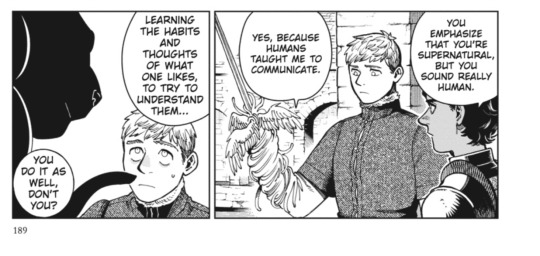
Kabru is a character who devotes a huge amount of time and effort to understanding people, and he is very good at it. In his internal monologue, we can tell how advanced and complex his skills of analysis are. He is able to read a huge amount of information just from looking at people's faces and body language.


People are, to him, what monsters are to Laios. This is something that's been expanded on at length in other, excellent meta. It's the fact that they're foils; it's the fact that Kabru is also very easy to read as autistic, with a special interest which is the opposite and parallel of Laios'. It's something that came out of trauma and alienation, as Laios' special interest in monsters also began as a coping mechanism.
The complicated origin of this "love" for monsters and for people comes through, I think, in the fact that one of the places we see both characters use their fixation is in being very, very good at killing the thing that they love. This also ties into the idea that loving something isn't even remotely mutually exclusive with using it to sustain your own survival; using it for your own purposes; hurting it or killing it. Love can be, and often is, violent, possessive and consumptive. This understanding is part of what makes Kui's depiction of interpersonal relationships so compelling to me.
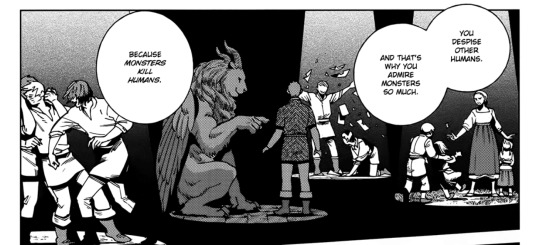
While Laios fixated on monsters and animals to seek a place of escape, in both his imagination and his self-image, from the humans who he couldn't understand and who couldn't understand him, Kabru seems to have fixated on understanding people in order to navigate the complex, socially marginal places that he has been forced into throughout his life. As an illegitimate child raised by a single mother with an appearance that marked him out as different to the point his father's family wanted to kill him, and a tallman child raised among elves who didn't treat him as fully human and wanted him to perform gratefulness for that treatment – treatment that, after he met Rin at age 9, he certainly always understood could be a lot worse – his ability to work out what people wanted from him, whether they were friendly or hostile or had ulterior motives, wasn’t just an interest. It will have been an essential skill.
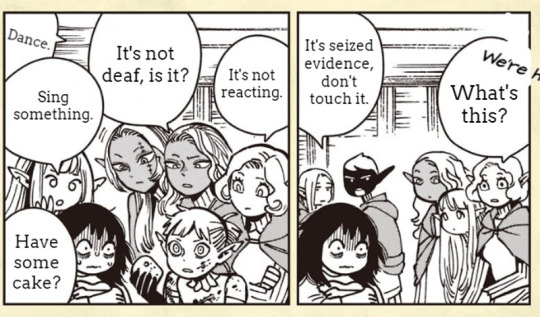
Milsiril, I think, was a flawed parent who tried to do her best by Kabru and did a lot of harm to him despite her best intentions. She may have treated him much better than an average elf would have, but like Otta and Marcille's mother, there are other elves with different outlooks on short-lived races. How would they judge her treatment of him? We don’t have any insight on what it could be, but to be honest, the person’s whose opinion of her I’d be most interested in knowing is Rin’s.
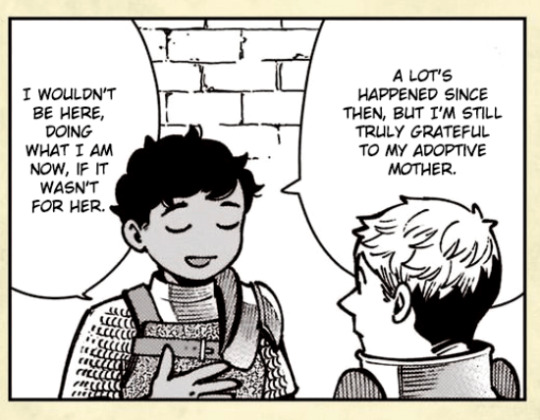
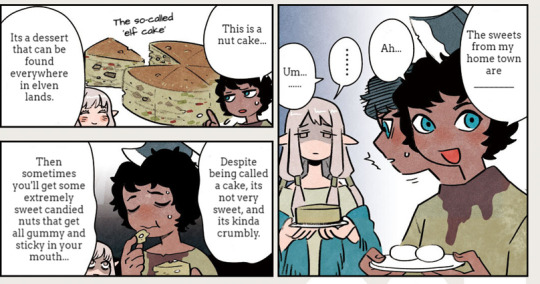
But even if she'd been perfect, living as an trans-racial adoptee in a deeply hierarchical nation with a queen who is a 'staunch traditionalist' who wouldn't even acknowledge the existence of a half-elf like Marcille (according to Cithis) is an experience that would deeply impact anyone.
Elves & Impossible mutual understanding
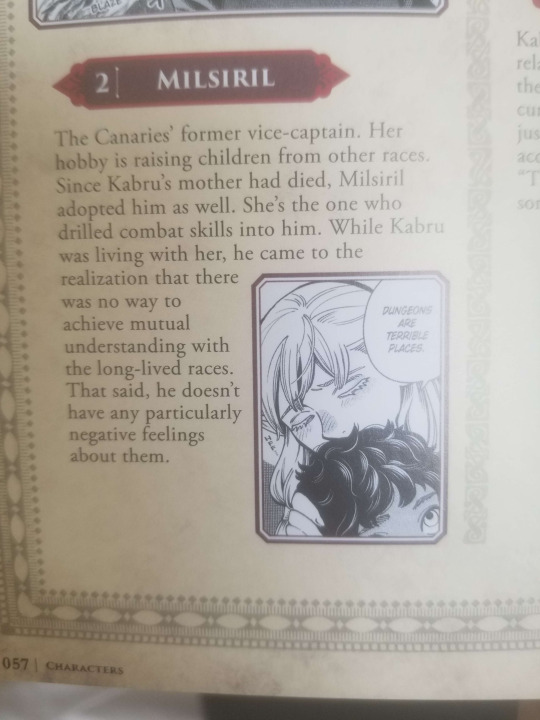
While Kabru was living with Milsiril - in other words, while living in the Northern Central Continent - he came to believe that "there was no way to achieve mutual understanding with the long-lived races."
This is evident in his political project: he wants short-lived races to have ownership over the dungeon's secrets. Despite his dislike of the Lord of the Island, he's a useful bulwark to stop the elves taking over. Despite his doubts about Laios, Laios needs to be the one to defeat the dungeon, because if he doesn't the elves will take over.
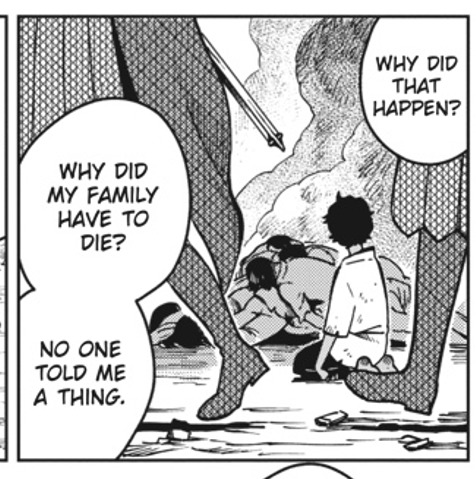
Kabru still carries a deep scar from Utaya, one that was exacerbated by the fact that he never got an answer to any of his questions about what happened or why. This, despite the fact that Milsiril knows about the demon and how it works. Do you think Kabru, with his social perceptiveness that borders on the superhuman, wasn't aware that she knew more than she would tell him?
Given that, the fact that he gets to a place where he "doesn't have any particularly negative feelings about [elves/long-lived species]" .... well, to put it bluntly, I believe that he thinks that's the case, but I kind of doubt it. After all, if he did have resentment, of Milsiril (someone who was his primary provider and caretaker since age six, and who despite her flaws, loves him and who I do think he loves) or of elves (who he has had to play nice with for most of his life, in order to survive, and will still have to play nice with in order to achieve his goals, since they hold all the power) what would that do except hurt him and make his life harder? Kabru is Mr. Pragmatic, so I don't think he'd let himself acknowledge any such feelings he did have. Exactly because he can't acknowledge them, they're well placed to get internalised as beliefs about the Fundamental Unchangeable Nature of the World.
However, these stated beliefs seem to contradict his actions. Despite his belief in the impossibility of forming a mutual understanding, he certainly seems to try to understand long-lived people, just as much as he does short-lived people. There's no noticeable difference between his treatment of Daya & Holm versus Mickbell & Rin that isn't clearly down to their relationship with him. His skills of human analysis were honed and developed while living amongst elves, and as soon as he's alone with Mithrun he immediately sets to understanding him - his interests, his motivations, his needs, and his past.
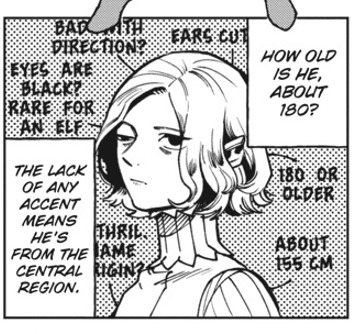
He treats him considerately and without bias, and despite the fact that Mithrun conquering the dungeon for the elves is both a reenactment of a core part of his childhood trauma and a political disaster for his aims, that doesn't seem to colour his perspective on Mithrun negatively at all.
This is something I find extremely laudable about Kabru, and it's another way he parallels Laios. He seems to understand that people, as a rule, (in Laios' case, he understands this about monsters - and eventually, all living beings) will act in their own interests, and if those interests conflict with yours, might harm you. But that's just their nature, and it's not something that should be held against them; you're also doing the same thing, after all. The crux of Laios' arc is precisely that he has to accept the responsibility of hurting someone else in order to achieve what he wants.
Kabru is deeply concerned with his own morals, what he should and shouldn't do, but mostly in the context of responsibility for the consequences - a responsibility he takes onto himself. He isn't scrupulous about what he needs to do in order to create the outcome he wants, but if he fails to create that outcome, then....
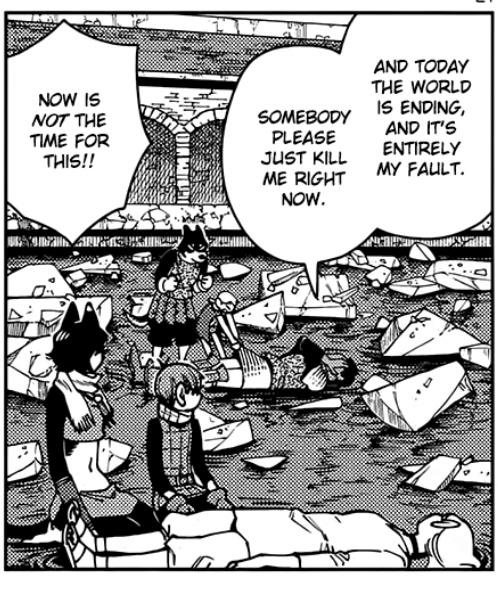
He blames himself to the point of thinking he should die. He doesn't blame Laios, or seem at all angry with him, despite concluding he should have killed him to prevent this outcome. That's because in his eyes, ultimately Laios was going to act according to his own nature, and it's Kabru's fault for not understanding that nature well enough. He's extremely confident in his ability to understand and predict others, (including elves and other long-lived people). Then, where does his conviction that mutual understanding is impossible come from?
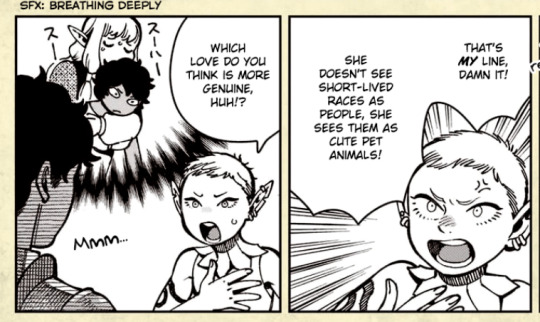
Partially, it's the "mutual" part. I'm sure Kabru, who isn't able or willing to deny Otta's insinuation that Milsiril saw him more like a pet than a son, has felt that his full interiority, the depth of his feelings and his ability to grow, act, and think as a fully equal being, was something that the elves around him just couldn't grasp. Because that was their excuse for it, he came to understand this as a gulf between short-lived and long-lived beings, an inevitable difference in outlook caused by their different lifespans.
This experience might be part of what leads to his iconic “fake” behaviour. He trusts his ability to understand others, but if they aren’t able to understand him, then there isn’t any benefit to being honest about his feelings and thoughts. If his attempts to reach mutual understanding with his caretakers were never able to be fulfilled, then it isn’t any wonder that he reacts with such surprise and horror at blurting out his desire to be Laios’ friend.
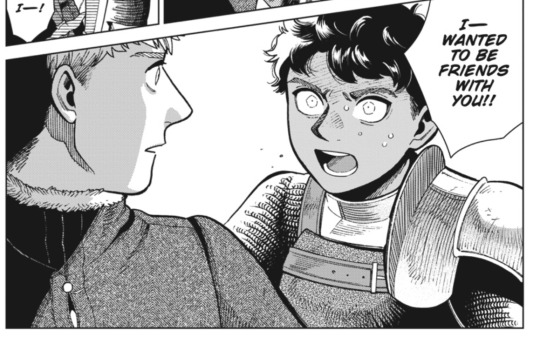
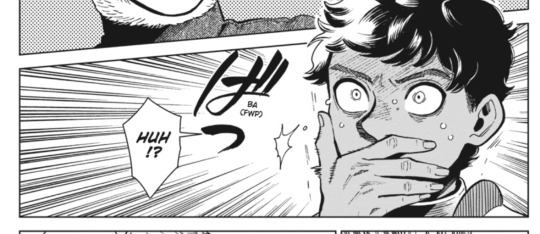
In his experience, making yourself vulnerable in that way only leads to being hurt. Soothing him, hushing him, lying to him, talking to him like a child that isn’t able to use proper judgement – that’s an inadequate and deeply hurtful way to respond to genuine distress, the desire for autonomy, or disagreement. Ultimately, I think that’s why he comes out on the side of being grateful to Milsiril; because she did equip him with the skills and knowledge he’d need to reach his goal, and let him go.
Though he could understand them, they couldn't understand him. To the extent that was true - which I'm sure it was - it wasn't due to anything about lifespan. It was due to the elves’ racism, and the solipsitic mindset & prejudiced attitude that it caused them to approach him with.
Because, if it needs to be said, the idea that there is an unbreachable gap in understanding between the long-lived and short-lived species is not true. Marcille and Laios have a much greater difference in lifespan than any full elf from any short-lived person, and they’re able to understand each other – maybe not perfectly, but better than many other people who are closer in life-span to them.
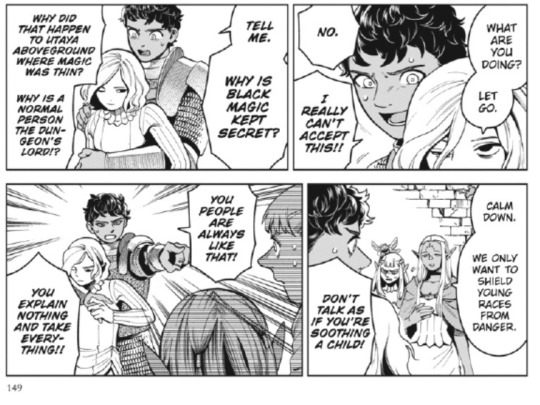
That doesn’t mean that I think Kabru is wrong about this, however. Because there’s an interpretation of his statement that is reflected in his actions and is true. When he talks about his problem with elves, it’s not just their attitudes: it’s their power, and what they use it to do. They “explain nothing and take everything”. Though it’s presented in the guise of ‘guiding and protecting’, in fact it’s a simple case of a powerful nation using their military power, wealth, access to resources, and historically stolen land – including the island itself – to protect their own interests and advance their own agenda. That’s why they’d be able to show up, seize the dungeon, and forcibly take Kabru’s party and Laios’ party to the West. If Kabru wants to stop that from happening, or change that status quo, persuasion or a bid to be understood would be completely pointless. Between the political blocs formed by long-lived species and the interests of short-lived species, “mutual understanding”, given their current, unequal terms, would be impossible. This is something that we see reflected in Kabru’s actions; before he asks his questions about the dungeon, he grabs Mithrun as leverage. He never really attempts to persuade the canaries to see his point of view, because that would be pointless: they’re agents of the Northern Central Continent’s monarchy, and will act in its interests regardless of any individual relationship with him.
I don’t think Kabru sees the different dimensions of this belief of his in quite such clear terms, however, as is evidenced by the other group who he thinks it’s impossible to communicate with.
Demi-Humans & Unknowable Objects
The other place that we see his conviction about the impossibility of mutual understanding is in the kobold extra.
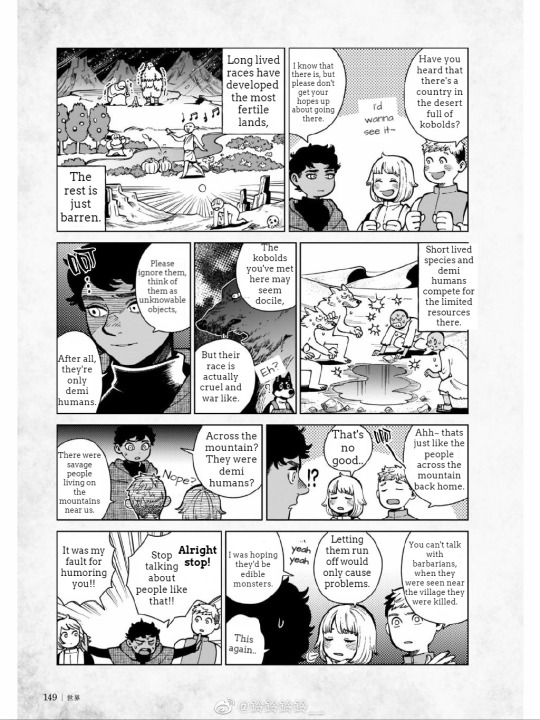
I'm including the whole thing, because I think it's an excellent and clever piece of world-building. Aside from what it says about Kabru, which I'll expand on shortly, what this extra does is deconstruct and call into question the usual "fantasy ontological biology" present in these sort of DnD-like settings. Essentially, the kind of worldbuilding where a race (such as kobolds) can be described as war-like, and that's establishing something essential about their biological nature. That's common to the point that if Kui didn't include this, some people would probably come away thinking that's the case about, e.g., the orcs.
But here, despite what Kabru is saying, the information the reader actually gets is:
the conflict between short-lived humans and demi-humans such as kobolds is mostly over access to material resources that they need to survive.
These resources are scarce because powerful nations, such as the elves, have monopolised them.
Kabru, who has grown up in a place at the centre of these conflicts, ascribes essential, negative traits to a cultural group which was in direct conflict with his own. Communication with this other group is impossible; they aren't people, they're more like objects.
oh yes! just like this conflict between groups of tall-men, a conflict which the reader will immediately interpret as more clearly analogous to real-life racism. Our other protagonists also carry prejudices from growing up in a place where a marginalised group was in conflict with the dominant group over scarce resources. It's definitely impossible to communicate with these people, and you can only kill them.
Woah, when you say it like that, it sounds pretty bad!
But also, nobody walks away having had a realisation or unlearned their prejudices - because they don't have the tools they need to do that work. Yet. I do think, to an extent, it could happen - especially with Kabru, since it's suggested in the epilogue that Melini might become a safe-haven for demi-humans.

To focus in on Kabru, the key here is his statement that you should think of demi-humans as "unknowable objects". Even his extraordinary powers of understanding have seemingly hit a limit. Part of this is just inherited prejudice, and doesn't need to have a complicated psychological explanation, any more than the elves who were prejudiced against him need one.
But also... this is probably somewhat linked to the way demi-humans seem to be considered "pseudo-monsters". They're the place that the strict delineation between the human and the monstrous is permeated. Laios, who is not interested in humans, remembers and is excited by Kuro. Chilchuck and Laios argue over whether it's OK to eat a mermaid. Kabru's prepared to (pretend to) roll with the idea that Laios ate the orcs.
But these are people, aren't they? Of course, this is a social construction, as we see from the fact that in the Eastern Archipelago, the label of "human" is reserved for tallmen, but in most of the rest of the world it depends on some obviously arbirary classification based on number of bones; "demi-humans" aren't in any essential way monstrous, except to an extent in their appearance, and physical location - due to their marginal social status, they're pushed out to live in unsafe places such as dungeons.
Therefore, Kabru's view of demi-humans as fundamentally "other", unable to be understood - monstrous - could be read as akin to abjection, the psychoanalytical concept described by Julia Kristeva. In order to create a bounded, secure superego, that thing which permeates and calls into question the border between self and other, human and animal, life and death, is rejected and pushed to the margin.
“Not me. Not that. But not nothing, either. A "something" that I do not recognize as a thing.[...] On the edge of nonexistence and hallucination, of a reality that, if I acknowledge it, annihilates me. There, abject and abjection are my safeguards. The primers of my culture.” (Kristeva et al., 1984, p. 11) “It is thus not lack of cleanliness or health that causes abjection but what disturbs identity, system, order. ” (Kristeva et al., 1984, p. 13) “The pure will be that which conforms to an established taxonomy; the impure, that which unsettles it, establishes intermixture and disorder. [...] the impure will be those that do not confine themselves to one element but point to admixture and confusion.” (Kristeva et al., 1984, p. 107) (discussing food prohibitions in Leviticus)
This is both (due to its affinity with food-loathing and disgust) a very fruitful concept to apply to dunmeshi, and a psychoanalytical theory which I wouldn't exactly cosign as True Facts About Human Psychological Development. You may also know the abject from its utilisation in the classic essay "Horror and the Monstrous-Feminine" by Barbara Creed - that's a lot more approachable than Kristeva if anyone's interested.
Key here, though, is that through the symbol of the "demi-human" is embodied a step between "human" and "monster" - and that's a prospect that puts at risk the whole notion of an absolute separation between those two categories in the first place. To Laios, that's something wonderful, and to Kabru, it's terrifying. We can see this principle further embodied in the relationship both characters have with the notion of becoming monstrous.
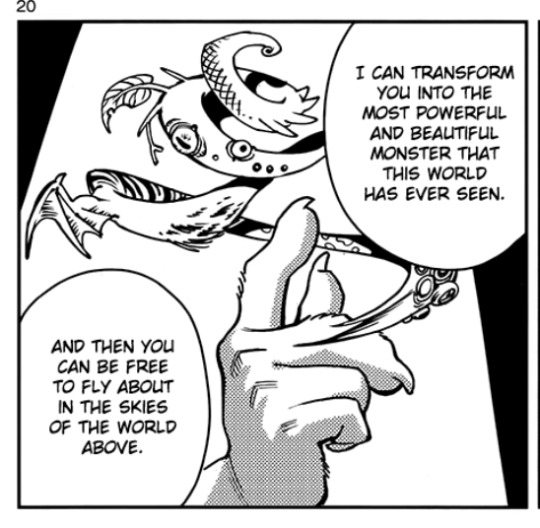
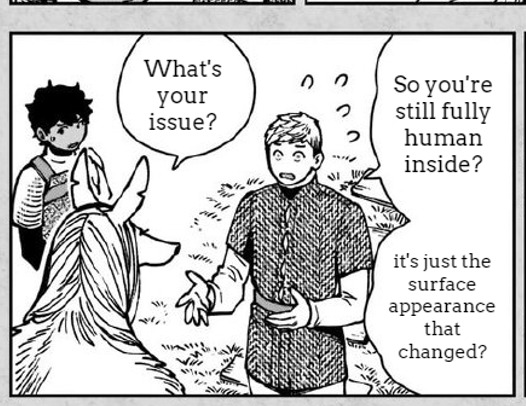
To Laios, this is transcendent, and represents a renunciation of everything human - in fact, if it didn't, it wouldn't "count".
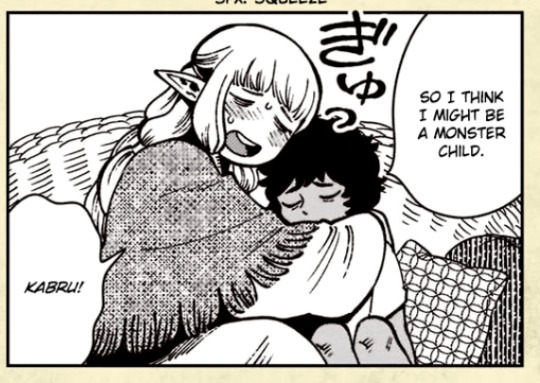
To Kabru, it's a deeply-held fear, established by his childhood alienation (due to his illegitimacy, his eyes, and perhaps also his neurodivergency), deepened by monster-related trauma and the sense of responsibility and survivors guilt he feels for what happened at Utaya. His identity as a human who is not monstrous is key to his sense of stability and safety; he doesn't want to touch monsters, he doesn't even want to see them.
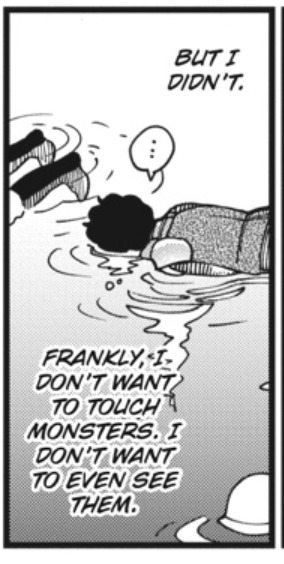
To acknowledge a kinship, a possibility of similarity between the things he loves (humans) and the things he hates (monsters) would be more than touching them - it would be putting them inside him. We know, quite explicitly, that this notion is triggering to Kabru. He literally has what seems to be a flashback when he's about to eat the harpy omelette.
So he abjects it, classifying the demi-human as fundamentally unlike him - an unknowable object, or an object that he refuses to know. Because in understanding it, he would interject the things he hates and fears into his self, which is already, always under threat by that hated and feared object.
Of course, again, Kabru isn't very good at enacting this refusal in practice. For one, when he chooses between his desires and ingesting the feared object, eating monsters... he eats monsters. Part of this is treating himself badly, the "ends justify the means" mentality. His goal is to destroy all monsters, so if he needs to become monster-like to do that, he will. But part of it is also the other motivation that he didn't even seem to know about until he said it: he wants to become Laios' friend, and to learn from him how a person can like monsters. He wants, at least in some part of him, to reconcile the feared and hated object into something he can understand.
For another:
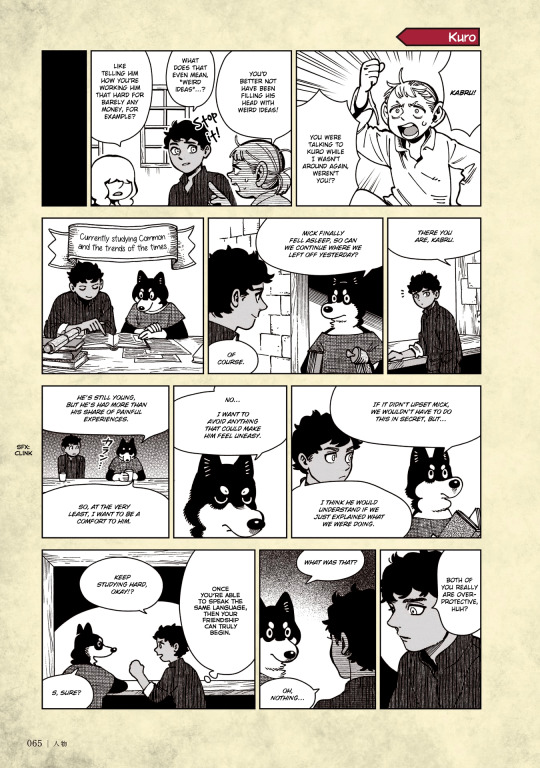
Kabru can speak the kobold language. In the first place, while this may have been common in Utaya, it also could have been something he chose to learn, an early expression of his interest in understanding and talking to all sorts of people. It isn't the kind of thing you learn if you believe that communication between yourself and the group that speak it is impossible, is it?
It's possible to harbour prejudices against a group while being kind to an individual, and given Kabru has those prejudices regardless of his reasons, that is what he is doing. But also, his treatment of Kuro doesn't reflect a sincerely held belief that he's an "unknowable object" at all. His approach is exactly the same as it is to any other person: an analysis of goal and motive, and an attempt to help if he's sympathetic and their goals align - going out of his way to give language and local knowledge lessons in secret. His conviction that Mickbell and Kuro will truly become friends when they can properly communicate is completely contradictory to any sense of demi-humans as fundamentally different, or impossible to reach mutual understanding with. To me, it seems like this self-protective shield against the corruptive force demi-humans as an idea present to his identity, this abjection, when Kabru is face-to-face with one, just simply can't hold up against his finely honed skill of intellectual empathy. Perhaps because he's autistic, it seems his "empathy" is less an emotional mirror response, and more a set of cognitive skills for analysis of others. That instinctual, emotional empathy might not trigger when presented with a member of an out-group, but if it’s possible for Kabru to turn his cognitive empathy off, we don’t see him do it.
This isn't to say that this prejudice doesn't affect his behaviour. For one, it could negatively impact his judgement of politics and policy, where individual people don't enter into it. For another, I'm not convinced he'd be willing to overlook Mickbell's exploitative relationship with Kuro if Kuro wasn't a kobold. As it is, since both of them are satisfied, he doesn't feel like he needs to intervene, regardless of the fact Mickbell isn't paying Kuro. But if Daya and Holm were in a relationship, and Holm took both Daya's and his own share from their ventures, but only compensated her in living expenses and kept the rest, do you think he'd tolerate it, for example? Even if she said it was OK?
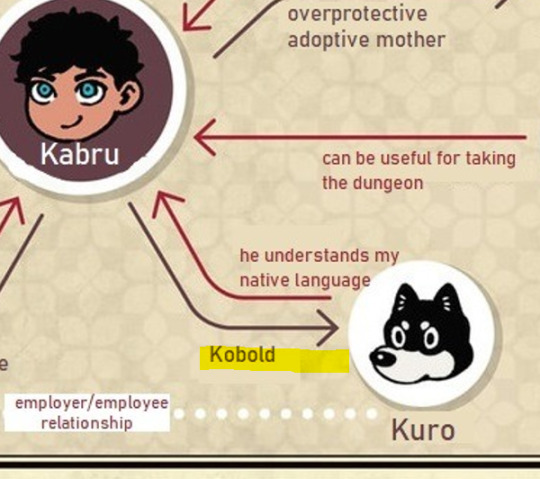
Conclusion

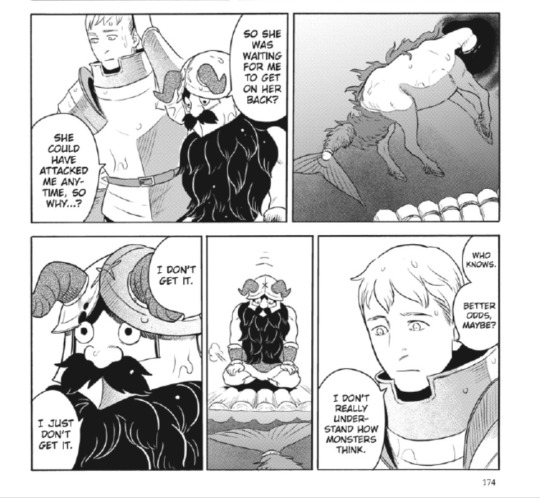
The kelpie chapter establishes that "people can never know what monsters are really thinking." That isn't just true of monsters, though.
True mutual understanding is impossible - between anyone. We can never truly understand another person's heart. This is touched on in, for example, the existence of shapeshifters and dopplegangers. Even a monster that seemed like a perfect copy of a person wouldn’t be that person, and wouldn’t be a satisfactory replacement.
We’re intended, I think, to understand the winged lion's repeated suggestions to just replace people who have been lost with copies as something uncanny, which demonstrates the way that the winged lion never manages to attain a complete understanding of humans. A version of a person who was created to fulfil your memories of them, to be the person who you wanted them to be, would be a terrible, miserable thing.
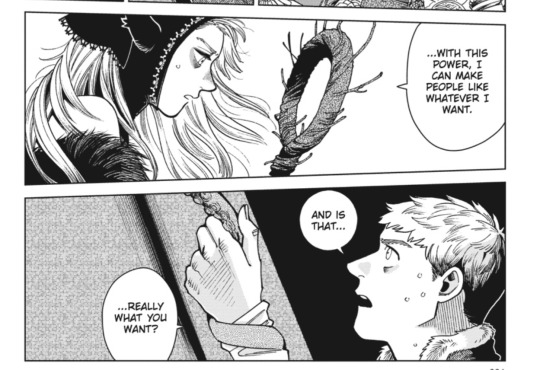
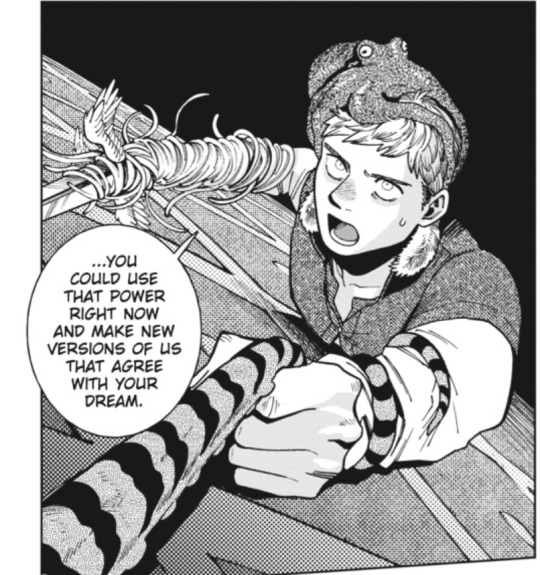

Disagreeing, coming into conflict, and misunderstanding each other, are essential parts of what it means to be living beings, as fundamental as the need to eat.
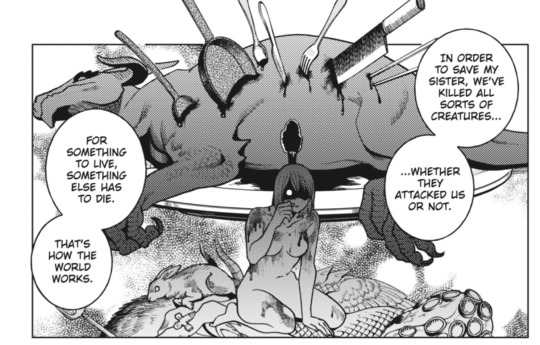
The only thing to do is not to take more than you need to eat to survive, and not impose your own desires onto others. To do your best to sincerely communicate your desires, even if they're embarrassing or vulnerable or strange, like Kabru eventually does with Laios; like Laios does, bit by bit, with the people around him; like Marcille does, Chilchuck does, Senshi does... to hope they will accept you, and do your best to understand them in return.
We can re-examine, in that context, Kabru's line about the elves' tendency to "explain nothing and take everything".
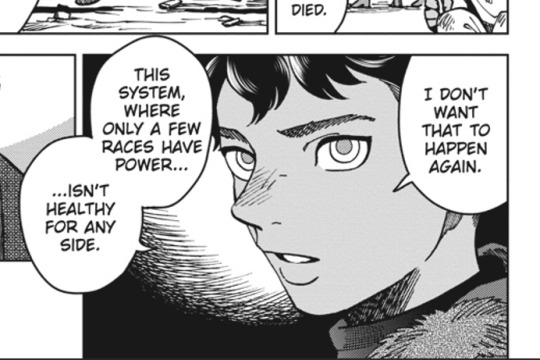
They have the power to impose their preferred "menu" onto less powerful groups. And in that context, mutual understanding being impossible just means that they won't give up their power because they're asked nicely. Kabru's goal is to seize the truth that they won't give to him, and to create a situation where they can't take everything. Because he's accurately surmised that nothing about the treatment of short-lived races will change so long as the power imbalance remains. Despite the way he mistakenly ascribes part of that to "long-lived vs short-lived" or "human vs demi-human", the actual gulfs in understanding he identifies are structural, are about power and about access to material resources and safety.
I think he could come to recognise this. Yaad is teaching him political science after all, and while a prince's lessons on political science won't exactly get at much that's radical or invested in the interests and perspectives of the marginalised (Capital is a critique of for a reason after all...) I believe in Kabru's ability to learn critically and get more from a lesson than it was intended to teach.
#og post#kabru of utaya#kabru dungeon meshi#laios touden#dungeon meshi meta#dungeon meshi#dunmeshi#dungeon meshi manga spoilers#dungeon meshi analysis#kuro dungeon meshi#the canaries#milsiril#continuing to develop my kabru theses.#literally sitting and thinking about kabru all day. rotating him.#he's in the microwave. to me.
2K notes
·
View notes